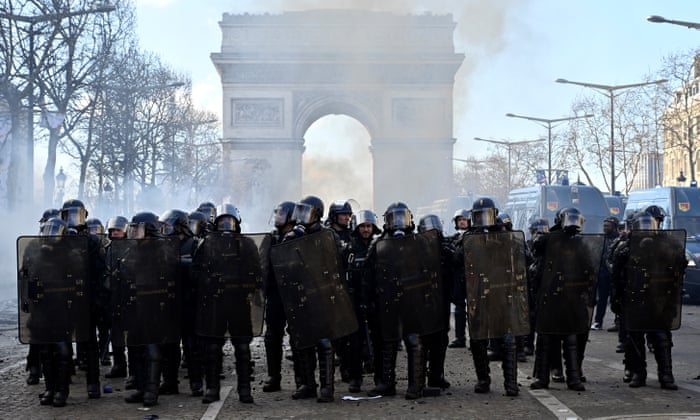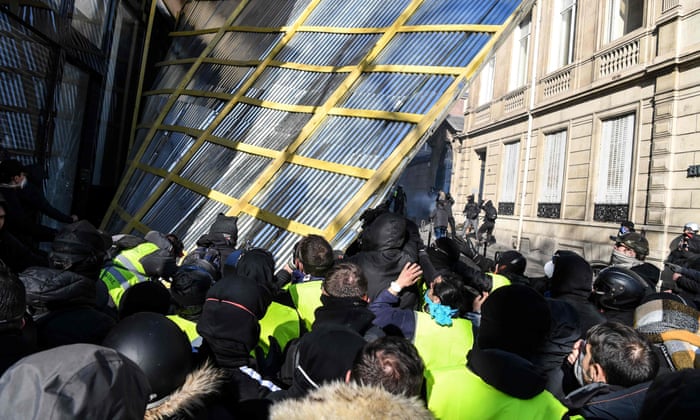France drafts in troops to prevent further gilets jaunes violence
Soldiers deployed in show of force in Paris and in Nice, which is hosting a state visit Riot police on the Champs Élysées in Paris last weekend. This weekend soldiers will be used to protect key buildings, freeing up police to control the crowds. Photograph: Anadolu Agency/Getty Images
Riot police on the Champs Élysées in Paris last weekend. This weekend soldiers will be used to protect key buildings, freeing up police to control the crowds. Photograph: Anadolu Agency/Getty Images Kim Willsher in Paris-
Kim Willsher in Paris-France has drafted in extra security forces including army troops to try to prevent any repeat of violence during gilets jaunes protests in Paris or other cities this weekend.
Police, gendarmes and soldiers will be deployed in a show of force in the capital and in the southern city of Nice, where the president, Emmanuel Macron, will meet his Chinese counterpart, Xi Jinping, for a state visit on Sunday.
Despite a ban on protests in parts of Nice, yellow vest organisers have called for a demonstration there on Saturday, the 19th day of action. Protests are also expected in other French cities.
Critics see the deployment of troops from Operation Sentinelle, which was established after the 2015 terrorist attacks in Paris, as provocative. Macron’s administration views the potential escalation of civil unrest as a serious challenge to its authority and is determined to regain the upper hand after it was accused of being unprepared for last week’s riots.
Last weekend protests in Paris were hijacked by rioters and looters who destroyed luxury shops, newspaper kiosks and one of the country’s most exclusive restaurants on the Champs Élysées. The Paris police prefect was sacked after his officers were accused of failing to stop the unrest.
The interior minister, Christophe Castaner, spoke to the mayor of Nice, Christian Estrosi, and the local prefect, Georges-François Leclerc, on Thursday to reassure them that security forces would be deployed to avoid a repeat of last weekend’s clashes and destruction.
Estrosi said a “large strategic area” of Nice, stretching from the airport to the area west of the port popular with tourists, had been designated off-limits to demonstrators.
However, some gilets jaunes said they would ignore the ban. “We the citizens are claiming the right to freely demonstrate. We gilets jaunes are on the streets to make our claims heard. Once again the state is acting against the fundamental rights of our society,” the group said in a statement.
It said gilets jaunes had been demonstrating in Nice for four months without serious violence. “On Saturday it will be the same people demonstrating in the same spirit. We haven’t changed. The gilets jaunes of Nice haven’t radicalised in a week.”
Lucien, 67, a gilet jaune and retired teacher, told Le Parisin: “It’s a loss of a fundamental right to demonstrate. They’re calling us all sorts of things: yobs, extreme right, extreme left. I’m a pacifist and I will be exercising my fundamental right of expression. These attempts at intimidation shouldn’t discourage us.”
Estrosi said the ban was a preventive measure. “The call to demonstrate is very threatening compared with previous occasions. Here they’re saying very clearly that having smashed up Paris, it’s Nice’s turn,” he said.
 Gilets jaunes protesters remove a barrier protecting a shop window on the Champs Élysées.
Gilets jaunes protesters remove a barrier protecting a shop window on the Champs Élysées.Photograph: Alain Jocard/AFP/Getty Images
Jean-Pierre Lellouche, the president of the Vieux-Nice business association, said his members were worried about losing trade. He said takings at his souvenir shop were down 30% since the gilets jaunes protests started last year.
“This is catastrophic for the French economy. Tourists have the impression the country is at war,” he said. “In Nice old town there are 750 shops and we live mostly thanks to tourism. A climate of fear is really not what we want.”
Until last Saturday, the gilets jaunes movement – which began as a grassroots protest against fuel tax increases, and grew to encompass wider political and social grievances – had appeared to be running out of steam. Protester numbers have been dwindling since their peak last December, the government has dropped the tax increase, and Macron has embarked on a “grand national debate” intended to listen to and address public grievances and take the sting out of the movement. Last Saturday’s violence on the Champs Elysées appeared to take the police and authorities by surprise.
Operation Sentinelle was launched after the attack on Charlie Hebdo and a kosher supermarket in January 2015, and involved increased military patrols across France. Officials say soldiers will be used this weekend to protect key buildings, freeing up police and gendarmes to control crowds. Bruno Leray, the Paris military chief, told French radio they could “go so far as to open fire …if their life is threatened or the life of those people they are defending”.
The hard-left politician Jean-Luc Mélenchon said Leray’s admission was “grave” and could “feed a fatal escalation” of violence. A number of gilets jaunes have been injured by police firing rubber bullets.
“Maintaining order is not a task to be given to the army. The army’s mission is to defend the nation against its enemies, and in no way can demonstrators be considered internal enemies,” Mélenchon wrote in a letter to the prime minister, Édouard Philippe, on Friday.
Castaner has insisted on “zero impunity” for protesters engaged in looting and vandalism but has refused to say how many troops will be deployed.
